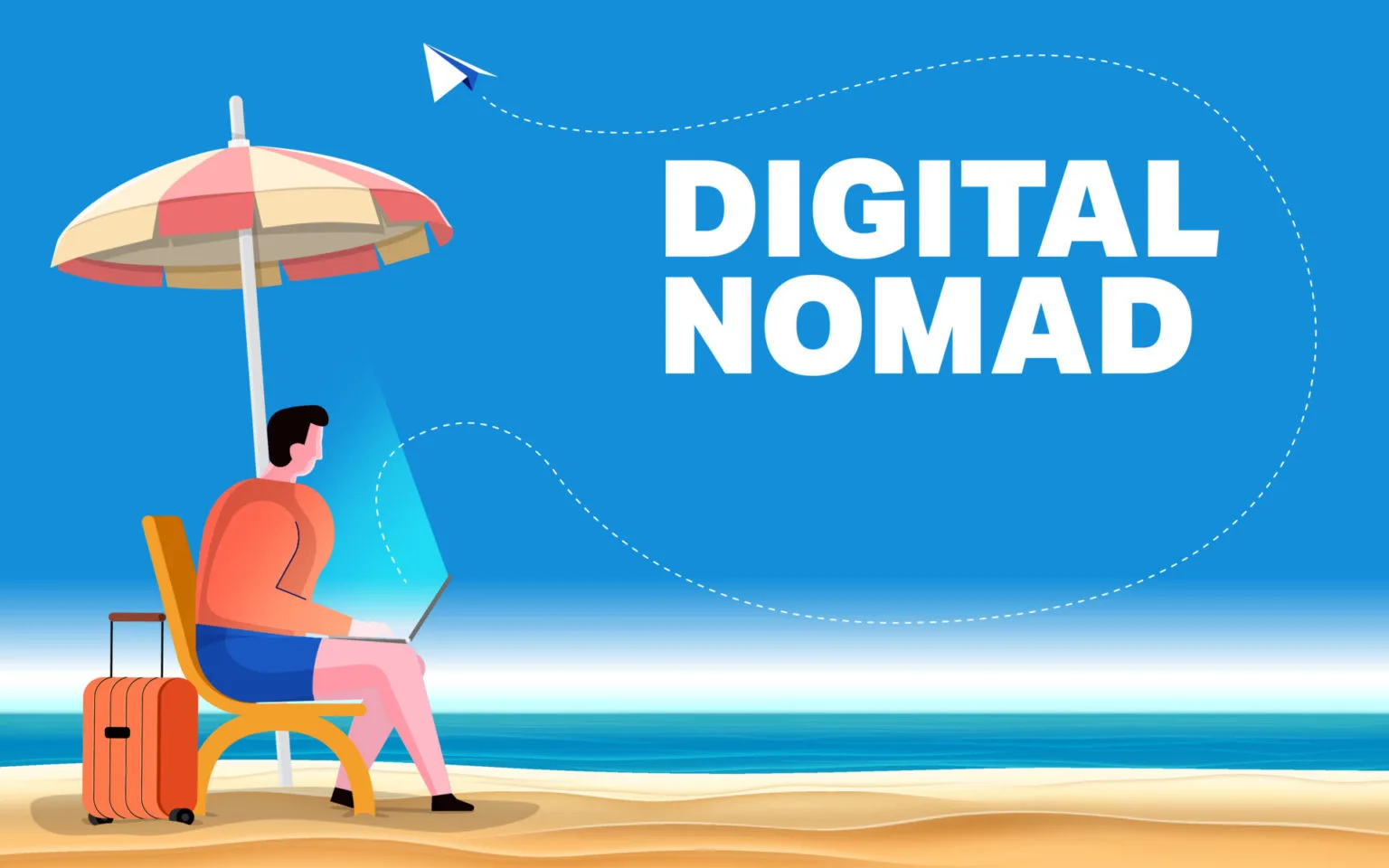Top Remote Jobs for Digital Nomads in 2025
Remote jobs for digital nomads are expected to offer new ways of working while travelling compared to current trends. If you are already a digital nomad or aspire to become one, you’ll be looking for jobs with flexible schedules and decent salaries. Here, we present remote jobs that will be popular in 2025 for those living the digital nomad lifestyle
1. Software Development
Software development remains one of the most remote-friendly occupations. Businesses need software developers to design and build applications, websites, and business systems. Key roles include:
- Frontend Developer: Focuses on user interfaces and customer-facing applications.
- Backend Developer: Manages servers, databases, and internal systems.
- Full-Stack Developer: Handles both frontend and backend aspects of development.
- Mobile App Developer: Creates applications for smartphones and tablets.
- Mobile App Developer: Creates applications for smartphones and tablets.
2 . Digital Marketing
Digital marketing involves promoting products or services using digital channels such as websites, social media, email, and search engines. It encompasses various strategies, such as content marketing, social media marketing, SEO, and PPC advertising, to reach and engage target audiences online.
SEO Specialist:
An SEO specialist focuses on optimizing websites to improve their visibility and ranking in search engine results pages (SERPs). They use techniques like keyword research, on-page optimization, and link building to attract organic traffic and enhance businesses’ online presence.
Content Marketer
A content marketer creates and distributes valuable, relevant, and consistent Content to attract and engage a target audience. They use various content types, such as articles, blog posts, videos, and infographics, to drive traffic, generate leads, and increase brand awareness. Content marketers often strategize content plans aligned with business goals to achieve marketing objectives effectively.
Social Media Manager
A social media manager oversees a company’s social media presence and strategy. They create Content, manage posts, interact with followers, and analyze performance to enhance engagement and brand visibility. Social media managers play a crucial role in building and maintaining a positive online reputation for businesses across platforms like Facebook, Instagram, Twitter, and LinkedIn.
Email Marketing Specialist
An email marketing specialist designs and executes email campaigns to reach and engage target audiences effectively. They create compelling Content, manage subscriber lists, and analyze campaign performance to optimize results. Email marketing specialists use strategies like segmentation, personalization, and automation to nurture leads, drive conversions, and build customer relationships through email communication.
These remote roles not only cater to the digital nomad lifestyle but also offer opportunities for professional growth and competitive compensation.


3. Graphic Design
Graphic designers are creative professionals who specialize in visual communication. They use their artistic skills and technical knowledge to create a wide range of visual Content for businesses and organizations. That includes designing logos, brand identities, websites, marketing materials, and more.
- Brand Designer: Shapes the visual identity of companies.
- UI/UX Designer: Enhances user interfaces and experiences for websites and applications.
- Illustrator: Creates original artwork.
- Motion Graphics Designer: Designs graphic animations for videos.
Graphic design is one of the most popular freelance careers due to its blend of creativity and technical skill, allowing talented individuals to work remotely.
4. Writing and Content Creation
Content creation offers numerous opportunities for writers and authors. This field includes:
- Copywriter: Creates Content for advertisements and marketing materials.
- Blog Writer: Generates articles for websites.
- Technical Writer: Produces manuals and guides for products.
- Video Content Creator: Makes videos for platforms like YouTube.
Many of these roles offer flexibility in terms of hours and project choices.
5. Virtual Assistance
Virtual assistants provide remote administrative services for organizations. They manage:
- Email Management: Organizing and handling email communications.
- Calendar Management: Scheduling appointments and meetings.
- Customer Support: Assisting customers with inquiries or issues.
- Social Media Management: Handling social media activities such as content creation and page administration.
Virtual assistant positions are noted for their flexibility across different time zones.


6. Online Teaching and Tutoring
The trend towards online education continues to grow, providing opportunities in roles such as:
- Language Tutor: Teaches languages to learners globally.
- Subject Tutor: Educates students in subjects like mathematics, natural sciences, social sciences, and history.
- Online Course Instructor: Conducts live seminars and classes on platforms like Udemy.
- ESL Teacher: Instructs English as a Second Language (ESL) learners.
These roles offer flexibility and are highly valued by their practitioners.
7. Project Management
Project coordinators and supervisors oversee various projects remotely, including:
- IT Project Manager: Manages technology projects.
- Marketing Project Manager: Handles advertising campaigns.
- Construction Project Manager: Oversees construction projects remotely.
- Agile Project Manager: Implements agile project management methodologies.
These roles require strong organizational and communication skills.
8. Data Analysis
Data analysts provide insights and recommendations to organizations based on data. Key roles include:
- Data Scientist: Analyzes large and complex datasets.
- Business Analyst: Applies data to improve business processes.
- Data Engineer: Builds data infrastructures.
- Machine Learning Engineer: Develops programs for predictive analytics.
These roles are well-compensated and often do not require physical presence in an office for most of the workday.
9. Customer Support
Many customer support roles have shifted to remote settings due to changes in organizational dynamics. Key positions include:
- Customer Service Representative: Handles customer inquiries and issues.
- Technical Support Specialist: Assists with technical problems or questions.
- Customer Success Manager: Ensures customer satisfaction through proactive interaction.
- Chat Support Agent: Assists customers via live chat.
These jobs typically offer flexible scheduling options.


10. Sales and Business Development
Sales and business development positions are directly responsible for increasing company revenues. Remote opportunities include:
- Sales Representative: The primary function is to sell products or services.
- Business Development Manager: Identifies new markets and customers for the business.
- Account Manager: Responsible for client relationships.
- Sales Engineer: Assists in technical sales development.
Some of these roles are highly mobile, which is perfect for dynamic individuals.
Tips for Digital Nomads to Find the Best Remote Jobs in 2025
With the steady growth of remote work, digital nomads have better opportunities than ever to find their dream remote and flexible jobs. Here are a few recommendations to help you choose the right career and search for suitable remote jobs in 2025:
1. Sign Up on Remote Job Boards
Many websites specialize in listing remote job opportunities. Signing up on these platforms can help you find location-independent careers.
- We Work Remotely: A popular job board for remote positions in various fields.
- Remote OK: Lists remote jobs in tech, marketing, design, and more.
- FlexJobs: Offers a curated list of remote and flexible jobs.
- AngelList: Focuses on startup jobs, many of which are remote.


2. Build a Strong Online Presence
A professional online presence can help you stand out to potential employers.
- Create a Personal Website: Showcase your portfolio, resume, and testimonials.
- Optimize Your LinkedIn Profile: Ensure your profile is up-to-date and highlights your skills and experiences.
- Use Social Media: Share your work and connect with industry professionals on platforms like Twitter and Instagram.
3. Network with Other Digital Nomads
Connecting with other digital nomads can provide valuable insights and job leads.
- Join Online Communities: Participate in forums and Facebook groups dedicated to digital nomads and remote work.
- Attend Virtual Events: Join webinars, online conferences, and networking events to meet like-minded professionals.
- Collaborate on Projects: Work with other digital nomads on freelance opportunities to expand your network.
4. Tailor Your Applications
Customize your resume and cover letter for each job application.
- Highlight Relevant Skills: Focus on the skills and experiences that match the job description.
- Showcase Remote Work Experience: Emphasize any previous virtual work positions you have.
- Include a Portfolio: Provide examples of your work to demonstrate your abilities.
5. Stay Updated on Remote Job Sectors
Keeping up with the latest trends in remote job sectors can give you a competitive edge.
- Follow Industry Leaders: Subscribe to newsletters and follow thought leaders on social media.
- Take Online Courses: Continuously improve your skills with courses on platforms like Coursera, Udemy, and LinkedIn Learning.
- Read Industry Blogs: Stay informed about new tools, technologies, and best practices.
6. Consider Freelancing
Freelancing can be a great way to find flexible job roles and build a diverse portfolio.
- Join Freelance Platforms: Websites like Upwork, Fiverr, and Freelancer connect freelancers with clients.
- Offer Specialized Services: Focus on niche skills that are in high demand.
- Build Long-Term Relationships: Aim to establish ongoing relationships with clients for steady work.
7. Log In to Online Learning Platforms
Enhancing your skills can make you more attractive to employers.
- Skillshare: Offers a wide range of courses on various topics.
- Udemy: Provides courses to improve your professional skills.
- Coursera: Partnered with universities to offer career-relevant courses.


8. Prepare for Remote Interviews
Remote interviews can be different from in-person ones, so it’s essential to be well-prepared.
- Test Your Technology: Ensure your internet connection, webcam, and microphone are working correctly.
- Choose a Quiet Location: Find a quiet, well-lit place for the interview.
- Practice Common Questions: Prepare answers to common interview questions and practice speaking clearly and confidently.
9. Stay Organized
Managing your time and tasks effectively is crucial for remote work.
- Use Productivity Tools: Tools like Trello, Asana, and Todoist can help you stay organized.
- Set a Schedule: Establish a daily routine to balance work and personal time.
- Track Your Progress: Regularly review your goals and achievements to stay motivated.
10. Be Adaptable
The remote work landscape is constantly evolving, so being adaptable is key.
- Embrace Change: Be open to new opportunities and willing to learn new skills.
- Stay Resilient: Remote work can come with challenges, so maintain a positive and resilient attitude.
- Seek Feedback: Regularly ask for feedback from clients and colleagues to improve your performance.
Effective Strategies for Digital Nomads to Build Their Professional Network While Traveling
Building a professional network is crucial for digital nomads, as it can lead to new opportunities, collaborations, and support while travelling. Here are some effective strategies to help digital nomads expand their professional network:
1. Attend Co-Working Spaces
Co-working spaces are hubs for remote workers and entrepreneurs.
- Join a Co-Working Space: These spaces often host networking events and provide a collaborative environment.
- Participate in Events: Attend workshops, meetups, and social events organized by the co-working space.
- Engage with Fellow Members: Introduce yourself and engage in conversations with other members.
2. Join Online Communities
Online communities can provide valuable connections with other digital nomads and professionals.
- Digital Nomad Communities: Join forums and groups on platforms like Facebook, Reddit, and Slack dedicated to digital nomads.
- Industry-Specific Groups: Participate in groups related to your field on LinkedIn or other professional networks.
- Engage Actively: Share your experiences, ask questions, and provide value to others in the community.
3. Attend Conferences and Meetups
Conferences and meetups are great opportunities to network with industry professionals.
- Search for Local Events: Use platforms like Meetup, Eventbrite, and LinkedIn to find events happening in your current location.
- Attend Industry Conferences: Plan your travels around major industry conferences and events.
- Network Actively: Introduce yourself to new people, exchange business cards, and follow up with connections afterwards.
4. Leverage Social Media
Social media platforms can help you connect with professionals globally.
- Optimize Your LinkedIn Profile: Ensure your profile is up-to-date and highlights your skills and experiences.
- Engage on Twitter and Instagram: Follow industry leaders, participate in relevant conversations, and share your work.
- Join Professional Groups: Participate in LinkedIn groups and Facebook groups related to your industry.
5. Collaborate on Projects
Collaborating with others can help you build strong professional relationships.
- Freelance Platforms: Use platforms like Upwork, Fiverr, and Freelancer to find collaboration opportunities.
- Open Source Projects: Contribute to open source projects or volunteer for non-profit organizations.
- Seek Partnerships: Look for opportunities to partner with other digital nomads on projects.
6. Take Online Courses and Webinars
Online courses and webinars can help you learn new skills and connect with other professionals.
- Enrol in Online Courses: Platforms like Coursera, Udemy, and LinkedIn Learning offer courses that include discussion forums and networking opportunities.
- Attend Webinars: Participate in webinars related to your industry and engage in Q&A sessions.
- Join Course Communities: Some courses offer dedicated communities for students to connect and collaborate.


7. Volunteer and Attend Local Events
Volunteering and attending local events can help you connect with the local community and other travellers.
- Volunteer for Local Organizations: Offer your skills to local non-profits or community projects.
- Attend Cultural Events: Participate in local festivals, workshops, and activities.
- Engage with Locals: Build relationships with locals who can introduce you to other professionals in the area.
8. Create and Share Content
Creating and sharing Content can help you establish yourself as an expert in your field and attract new connections.
- Start a Blog or Vlog: Share your experiences, insights, and expertise through a blog or vlog.
- Publish on LinkedIn and Medium: Write articles on professional platforms to showcase your knowledge.
- Engage with Your Audience: Respond to comments, participate in discussions, and connect with your readers.
9. Use Networking Apps
Networking apps can help you find and connect with other professionals nearby.
- Shapr: A networking app that connects you with professionals based on your interests and location.
- Bumble Bizz: Use Bumble’s professional networking mode to connect with industry peers.
- Meetup: Find and join local meetups based on your interests and profession.
10. Follow Up and Maintain Relationships
Building a network is not just about making connections but also maintaining them.
- Follow-Up After Meetings: Send a follow-up message or email after meeting someone new.
- Stay in Touch: Regularly check in with your connections and update them on your progress.
- Offer Value: Assist, share relevant information, and support your network whenever possible.
Conclusion
Remote work is growing, and digital nomads have many exciting job opportunities. From software development to sales, these roles offer flexibility, good pay, and the chance to work from anywhere. As the demand for remote work increases, now is the perfect time to explore these opportunities.
By focusing on these top remote jobs, digital nomads can enjoy a balanced and rewarding lifestyle, combining work with the freedom to travel. The future of work is remote, and the possibilities are endless.













